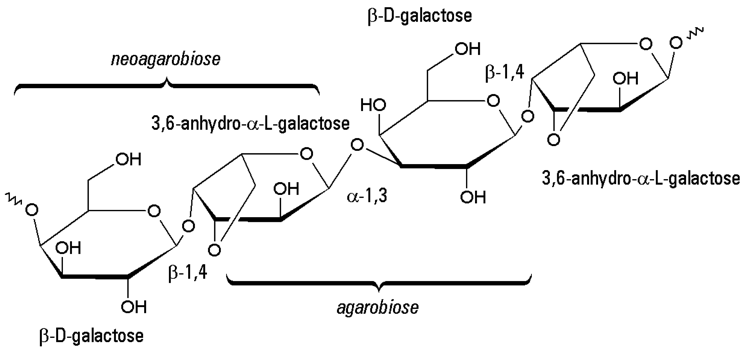Agar agar is a hydrocolloid biosynthesized in the cell walls of red seaweeds (Gracilaria, Gelidium and Pterocladia species), composed by a complex mixture of homogeneous polysaccharides: Agarose and Agaropectin.

Agarose, is a strongly gelling, non-ionic polysaccharide which is regarded as consisting of 1,3- linked β-D-galactopyranose and 1,4-linked 3,6-anhydro-α-L-galattopyranose units.
Agaropectin, is a less clearly defined, more complex polysaccharide having sulfate groups attached to it, that strongly influence solution properties, gelling kinetics and gel features.
Agar agar is a well accepted and label friendly natural additive used as a gelling agent, thickener, texturizer, moisturizer, emulsifier, flavor enhancer and absorbent in the food industry and in a growing number of cosmetic, pharmaceutical and technical applications.
Agar agar can serve also as a natural source of vegetable origin dietary fiber and as an intestinal regulator. Once ingested, the powder hydrates and absorbs a large amount of water. This results in the consumer feeling fuller.
Agar agar may also be used as the gelling agent in gel clarification, a culinary technique used to clarify beer and other liquids.
Refined agar is usually used as the solid or semi-solid culture medium of microorganisms analysis.
The agarose fraction extracted from agar is also extensively applied in clinical assay, biochemical analysis and purification of high weight biological molecules like DNA.
Agar properties:
- Agar agar is a versatile hydrocolloid completely soluble in boiling water.
- Special Agar agar powders can be dissolved at lower temperatures.
- Agar provides odourless, colourless superior quality gels even at very low concentrations.
- It has good synergies with sugars and with different hydrocolloids.
- Agar is the strongest natural jelling agent and provides a thermo reversible gel.
- Agar solutions gel at temperatures from 35 °C to 43 °C and melt at temperatures from 85 °C to 95 °C.
- Agar agar is the only hydrocolloid that gives gels that can stand sterilization temperatures and has an excellent resistance to enzymatic hydrolysis
- Agar agar does not require addition of other products or ions for gelatinization
- Agar reacts only with water which allows its incorporation in most of the food formulations
- Agar is perfectly compatible with proteins, for example in dairy application


